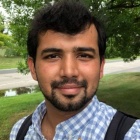Abhilash Kishor Joshi

"Working at UB lab facilities literally day and night on that (IoT) project changed my life. When I reflect on the value that was instilled - that if we believe that we can change the world positively, then YES, we can!"
Level of Study: MS '19
Hometown: Mumbai, India
Why did you choose to study electrical engineering?
My specialization is Networking, Telecommunications and IoT. Courses in these areas are available at UB and also an opportunity to do research. UB was the best choice for me being a public university with quality research carried out on campus.
What do you like best about electrical engineering?
Electrical Engineering is synergy of different sub-branches like Energy Systems, Photonics and Solid State Electronics, Communications and Networking, where an individual is free to choose and create a specialization in itself. The ecosystem in which the Electrical Engineering Department thrives is very healthy and pretty systematic as far as courses and professors are considered.
What makes UB Electrical Engineering special?
The Professors, Labs and ever helpful Dr. Bartelo :) makes UB Electrical Engineering special.
Our department is magnet for talent from the world. During my period at UB as a Master's student I got to meet different professors, PhDs, working professionals from around the globe, and people from renowned universities like MIT, UC Berkeley, etc. in the Graduate Seminar Series. In fact, I cannot forget my first day memory of stepping into our department and attending a guest lecture by an Intel Labs Engineer!
So, our department keep students motivated with the belief that we can change the world and make our mark!
A favorite memory of your experiences/classes/projects?
Labs.. Labs.. Labs.. !! Working in the Electrical Engineering department's labs are my favorite memories.
From semester 1, I started working in labs. I took NSD, PNET and PCCN taught by Prof. Elena Bernal Mor, and the guided lab assignments were a really good push to the thought process for how we develop demo systems in a miniature form, and where the concepts taught in class can be realized. I worked under Prof. Zhi Sun by taking an independent study course and I assisted one of his PhD student to create and model a Physical Layer Security device that would make a dent in the IoT Security market. I learned from scratch about USRPs, fabricating circuits on copper boards, etc. Then, a journey took place to develop the entrepreneurial project, ColdSpace LLC, under the guidance of Prof. Jornet. Working at UB lab facilities literally day and night on that project changed my life. When I reflect on the value that was instilled - that if we believe that we can change the world positively then YES, we can!
I had similar experiences working on my other projects like IoT final class project where we developed an App named Mushroom as a service to facilitate the IoT market by providing a singular platform, accessing all the cloud technology on your finger tips on a mobile phone app.
Surely during the classes we had our own fun as students to push hard to complete the assignments on time. Have brain cracking questions and answer sessions with Prof.s so that was helpful a lot.
Tell us about your career:
I had internships as an Internet of Things Engineer at ColdSpace LLC, and then I worked as Network Automation and Systems Engineer at Buffalo Automation (Thank you UB Electrical Engineering and TCIE for helping students to earn as well as apply knowledge in local to Buffalo start-ups).
Today I work as a Cloud Engineer at Performics in Greater Chicago Area, Illinois.
My work involves to work as a cross-functioning Cloud Engineer delivering my expertise and opinions, and also learning about deploying network Architectures on Cloud environments (especially Google Cloud Platform for Analytics and Amazon Web Services for defining virtual Data Centers).
Anything else you would like to mention?
I am really excited for new EE faculty working in Data Analytics and giving courses on Programmable Networks. These courses will help the incoming batch of students to develop their skills on the rising tides of market requirements.
In the age of automation, Electrical Engineers are required to program existing telecommunication architecture and also develop new architecture so the both can be on the same page or compatible with each other.